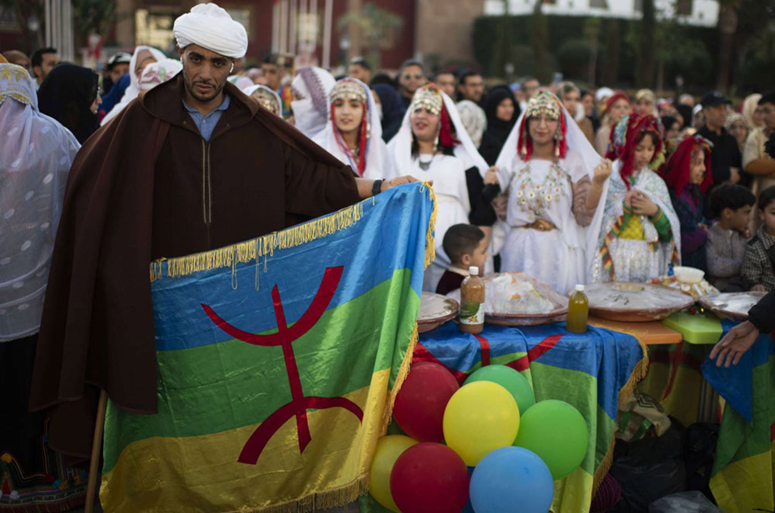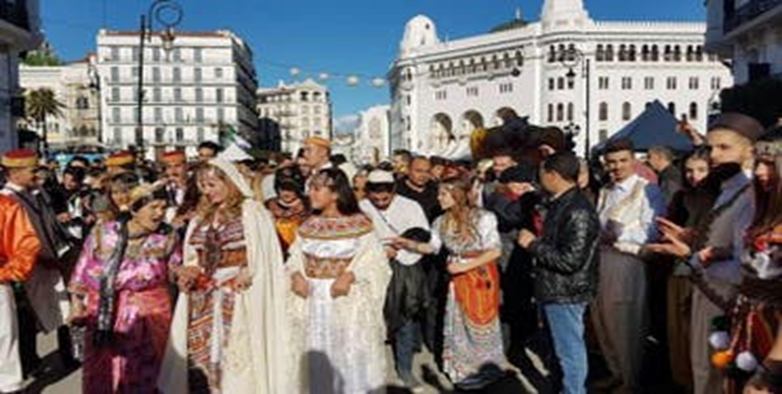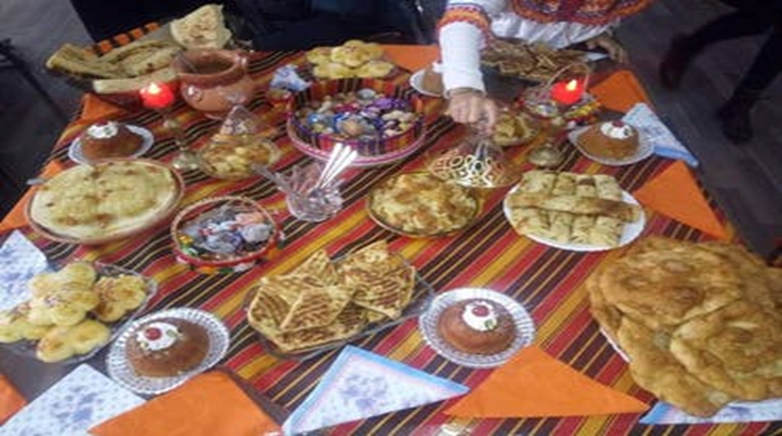“Asqas Amghaz”...the Amazighs of the world celebrate the New Year 2974

The Amazighs of the world in general and North Africa in particular celebrate “January” in the second week of this month, Friday, January 12 in Algeria and the 14 of the same month in Morocco. It is the Amazigh New Year 2974. This holiday is considered an important historical and cultural legacy for the Amazighs, who make great efforts and sacrifices to preserve their identity and original culture in light of globalization and the clash of cultures, as well as the attempts of some political regimes to obliterate this rooted identity.
The landscape has not changed for hundreds of years. Every night before the Amazigh New Year , Amazigh families prepare a couscous dish with chicken meat crowned with dry vegetables.
Family members gather around this dish and chant songs welcoming the arrival of the new year, praying that it will bring goodness to everyone and the farmers in particular and that heavy rains will fall, in order to irrigate the lands that are one of the sources of livelihood for the Amazigh, the majority of whom live in mountainous areas.

This year also, the Amazighs (free men) celebrate on Friday, January 12, in many countries of the world the New Year 2974, which is called “January.” The word (January) means in the Amazigh language “Khafa Ousghas” and it is the first month in the Amazigh agricultural calendar. January is considered a historical legacy for the Amazigh.
Over the years, it has developed special rituals that are celebrated to this day, as families meet, exchange visits, and gather around a table of traditional dishes around which all attendees gather, while spoons are placed specifically for the absent, so that no one forgets them despite their distance.
From the Amazigh crisis in 1949 to the recognition of the Amazigh language
Algeria, like other North African countries, such as Morocco, Tunisia, Libya, some Sahel countries like Mali, Niger, Mauritania, Burkina Faso, and all the way to the Sahara, whether in Egypt or the Canary Islands in Spain, also celebrates the Amazigh New Year after it constitutionally recognized in 2016 that the Amazigh language is an official language alongside the Arabic language.
This recognition did not come easily, but rather came as a result of huge sacrifices made by the country’s Amazighs, led by the tribes, who have not sufficed since the so-called “barbaric crisis” that broke out in 1949 to demand their rights and recognition of their identity, culture and language, especially since the Amazighs constitute the first inhabitants of the North African region. According to the thinker Ibn Khaldun in his book “The Introduction.”

In a telephone interview with France 24, Taher Mutrif, head of the Amazigh Cultural Association of the city of Montpellier (south-eastern France), confirmed that the Amazighs of the world, and in particular the Amazighs of Algeria and Morocco, struggled and made great sacrifices for their governments and countries to recognize their identity, culture and original language.
He said: “In Algeria, we cannot forget the protests and demonstrations that were organized in April 1980 in the city of Tizi Ouzou (the Kabyle capital) and other cities in the Kabylie region, where students and young men of different ages took to the street to say, “We are not Arabs, but Amazighs,” and demanded that the Amazigh language be taught in the country. Schools and universities. But the regime of then President Chadli Bendjedid met them with bullets and dispersed the protests by force, causing nearly 200 deaths.”
Although the final and true outcome is not known yet, the acts of repression and killing carried out by special forces of the Algerian army were mentioned by the revolutionary singer Matoub Lounes in a song titled “Let the inhabitants of Oued Issa grieve,” which is the location of the University of Tizi Ouzou, which was among the Organizers of these protests.
Algeria, from suppressing the Amazigh to recognizing their identity
Matoub Lounas, who was killed by 78 bullets by unknown assailants in 1998, says in his song, “Let Wadi Issa be sad when the killing began and the soldiers arrived at night... All the villagers rushed to Tizi Ouzou to defend their identity. This is not stupidity. We want freedom before they confine us to the corner".

This song gained great admiration in Algeria and abroad and opened the eyes of many to the fact that the regime, led by President Houari Boumediene, and then other presidents such as Ben Bella, hid it, namely that Algeria, like the rest of the North African countries, is Amazigh in identity and origin, and that its residents are the owners of the land.
In 2001, residents of the Kabylie region in a “ Black Spring ” took to the streets again to organize a march from the city of Tizi Ouzou to Algiers to demand recognition of their identity and rights. While more than a million people decided to walk a distance of one hundred kilometers. But when they arrived at the entrance to the Algerian capital, they were received by unknown assailants armed with white weapons and were subjected to unprecedented attacks, while security forces also intervened, using live bullets, which led to the death of 121 people and the injury of hundreds.
Recognizing Amazigh as an identity and language
This setback left a deep political crisis and a major rift within Algerian society. While the Bouteflika regime at the time and its prime minister, Ahmed Ouyahia, who is also of Amazigh origin, tried to remedy and calm the situation and begin gradually recognizing Algeria’s Amazigh identity and the Amazigh language.

In 2016, the Amazigh language was recognized as an official and national language alongside Arabic, and it began to be taught in schools and universities, and all the names of state institutions were recorded in this language alongside Arabic and French. This is the same issue in Morocco, which also recognized Amazigh as an official language in 2011, after Arabic. The Amazigh population is about 100 million people, but there are no accurate statistics.
The Arabization policy was imposed in Algeria in the 1970s, which was considered an attempt to erase the Amazigh identity of the Algerians and to erase the French language, which is the legacy of the liberation war on the other hand. Some believe that the regime at the time also courted the Islamists to fight the Amazigh movement, which was raising slogans that the authorities did not accept, including demanding democracy, freedom of expression, ending corruption, and allowing every person to live according to their culture and religious freedom.
But with the emergence of social networking sites and the interest of international media in the Amazigh issue, and thanks to the Amazigh artists who marketed the content of this culture through their songs, such as the singer Idir, Matoub Lounes, Ait Menghalat, the Tinarwan band from the Tuareg Amazigh, and Rouicha and Al-Damsiri from Morocco, Amazigh culture reached all parts of the world. While Amazigh expatriates living in Canada, the United States, Britain, Australia, and European countries have marketed this culture by organizing many cultural and artistic events for the rest of the world to discover.

In France, in addition to the celebrations organized by numerous cultural associations, the capital, Paris, will witness on Saturday a large concert in the “Zenith” hall, performed by the famous young artist Mohamed Alawa. As for Algeria, the well-known singer Lounis Ait Menghalat delights his Amazigh fans and others with his committed and warm songs in the Oval Hall. To everyone we say: “Asqas amghaz.”
Source : websites

